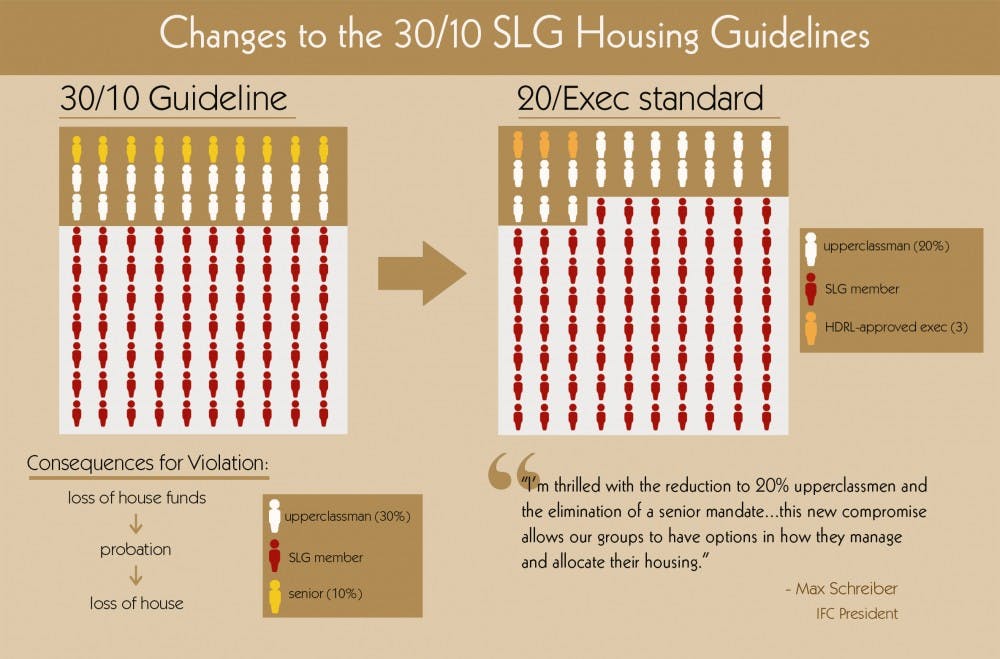Duke Student Government and Housing, Dining and Residence Life have come to an agreement on alterations to the 30/10 housing guidelines announced in the spring and implemented this fall.
The alterations add a set of additional guidelines that selective living groups, including Greek houses, can follow to avoid some punishments for not meeting the 30/10 guideline introduced in 2012—which states that 30 percent of a house’s occupants must be upperclassmen and 10 percent must be seniors. Administrators announced in January that houses which failed to meet the 30/10 standard would be put on probation and eventually have their sections revoked.
Under the new system, if SLGs do not meet the 30/10 guideline, they will still lose a semester’s worth of residential programming fees or house council funds. Houses can now avoid having their section revoked, however, if they follow the “20/Exec Standard.” This new standard states that if juniors and seniors occupy 20 percent of the house and three of six HDRL-designated executive members live in section, the group can avoid a warning, probation and eventual loss of house.
“There was clearly a lot of concern expressed by a lot of students last spring after the initial communication of the 30/10 guideline,” said Dean for Residential Life Joe Gonzalez. “We had a lot of conversations with student group leaders describing the difficulties this might create for them.”
The original 30/10 guidelines—which Gonzalez said are intended to increase three-class representation in houses—did not include a way for student groups to avoid punishment if they failed to meet the guidelines. Under the old policy, the SLG would be put on probation for not meeting the quotas, and if the group was on probation for two out of three academic years, then it would lose its house.
Under the new rules, if the SLG fails to meet the 30/10 guidelines but does meet the 20/exec standard, the only punishment it will receive is the loss of house council funds. The group will receive a warning if it does not meet either of the standards, however. If the 20/exec standard is not met for a second year, then the SLG will be put on probation. Once put on probation, the SLG must meet the 20/exec standard for two years in order to end probationary status, and if the SLG fails to meet this standard for the next two years, it will lose its house.
DSG Vice President for Residential Life George Mellgard, a junior, worked with Gonzalez and DSG President Keizra Mecklai, a senior, to find an agreement that would satisfy both student groups and HDRL.
Mellgard said that DSG originally put together a proposal which would allow SLGs to bypass the 30/10 requirement by holding events and meeting certain social standards. But when DSG approached HDRL with their proposal—which included a version of the 20/exec standard—they quickly realized that DSG and the administration had different goals, he said.
“There were a lot of minutia in the original proposal, including rules around things like community service events and damages,” Mellgard said. “That stuff is gone now, because administration just wanted a consequence for [groups which failed to satisfy the] 30/10 plan.”
He added that the chief victory achieved by DSG and student groups was lessening the consequences that SLGs face for failing to meet the 30/10 requirements.
DSG was able to create this compromise by working to understand the administration’s goals, Mecklai explained.
“The first step was to listen and understand what administration’s perspective was,” Mecklai said. “That will really be our principle going forward—we’ll ask what administration wants to see and how can we understand that and use that as a foundation for what changes we want to make.”
She added that the hardest aspect of the negotiation was the loss of residential programming funding when groups fail to meet 30/10 guidelines. There were concerns that some groups would be able to absorb the loss more easily than others due to their socioeconomic status, she explained.
“We ended up realizing that, according to the students we talked to, this residential programming fee wasn’t something that would be a socioeconomic divider,” Mecklai said. “If it was going to be a problem, the group could simply work to comply with the 30 percent upperclassmen requirement.”
Interfraternity Council president Max Schreiber, a senior, praised the elimination of the 10 percent senior mandate, which contradicted HDRL’s guarantee to seniors that they would be able to live off campus.
“This new compromise allows our groups to have options in how they manage and allocate their housing,” he wrote in an email.
He added, however, that requiring groups to forfeit their house funds—which he described as a “sin tax”—when they choose to meet the 20/exec standard instead of the 30/10 standard was frustrating. In the long-term, IFC will be working to make the residential programming fee optional for every student group, he said.
Gonzalez noted that the negotiations between DSG, student groups and HDRL demonstrates that compromise and cooperation are possible even when students and administrators at first disagree.
“This is a great example of how positive outcomes can be accomplished by working together,” he said. “There’s been a strong history of this type of partnership with the housing experience.”
Get The Chronicle straight to your inbox
Signup for our weekly newsletter. Cancel at any time.

